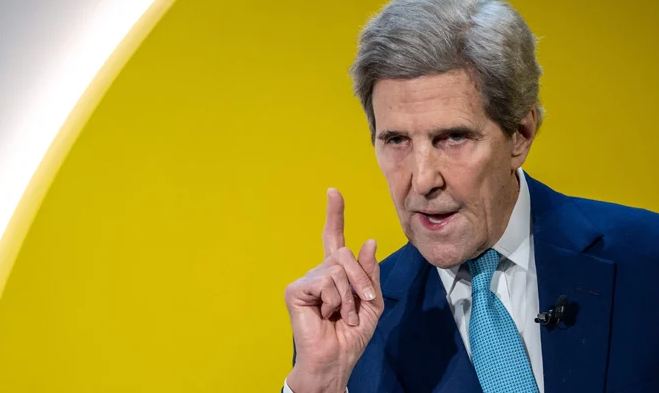In an attempt to revive climate talks which were stalled for years after a US official’s visit to Taiwan, the Biden administration’s climate envoy John Kerry met with his Chinese counterpart Monday and discussed carbon emission for four hours, as the world is witnessing record temperatures and heatwaves.
Climate diplomacy suffered a stall after the then-US House Speaker Nancy Pelosi visited Taiwan — which China considers its territory — infuriating Beijing.
A former secretary of state under former US president Obama enjoyed close and consistent relations with China despite the differences between both countries on a number of issues.
According to Chinese media, Kerry met his Chinese counterpart Xie Zhenhua for four hours of talks in Beijing Monday.”
“Xie Zhenhua, China’s special envoy for climate change affairs, concluded his talks with John Kerry, the special envoy of the US president for climate issues, which lasted for around four hours,” broadcaster CCTV said.
US National Security Advisor Jake Sullivan told CNN Sunday that Kerry would press Beijing not to “hide behind any kind of claim that they are a developing nation” in order to slow-roll efforts to cut emissions.
“Every country, including China, has a responsibility to reduce emissions,” Sullivan said.
“And the world, I do believe, should step up and encourage — indeed, pressure — China to take far more dramatic action to reduce emissions.”
China has long used its official status as a developing nation to justify its high emissions, with Sullivan saying “there is more work for them to do on that front”.
“Secretary Kerry will make that point when he’s in Beijing,” he added.
Determination
Kerry’s trip follows two other high-profile visits by US officials — Secretary of State Antony Blinken and Treasury Secretary Janet Yellen — that were aimed to normalise ties between the US and China.
His trip to China came as the northern hemisphere endured record-setting summer heatwaves, which scientists say are being exacerbated by climate change.
“The Kerry visit and the resumption of climate interaction underscores the critical importance of coordinated efforts to address the climate crisis,” Chunping Xie, Senior Policy Fellow at the Grantham Research Institute on Climate Change and the Environment, told AFP in written comments.
“It also demonstrates their shared determination to navigate a complex geopolitical relationship to promote the common good,” said Xie.
As the leading emitter of the greenhouse gases driving climate change, China has pledged to peak carbon emissions by 2030 and achieve complete carbon neutrality by 2060.
President Xi Jinping has also said that the country will reduce its use of coal from 2026.

















